Things are changing in the packaging world. Euro Pool System (EPS) is replacing its rigid crates with folding ones. This Dutch company focuses on reusable packaging in the European fresh produce chain. “Euro Pool System started off using rigid crates back in the 90s,” says Dirk Vercammen, Regional Director at EPS.
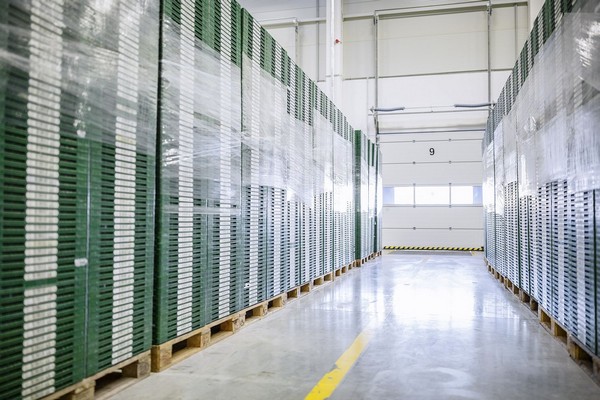
Euro Pool System (EPS) is replacing its rigid crates with folding ones as of 1 february
Replacement
The EPS blue crates have been the standard for fruit and vegetable transportation in Europe since 1992. Growers use these to transport their products to sellers. The crates are then washed and returned to the growers. “In recent years, replacing cardboard or wooden crates has already improved the chain’s sustainability. We’re now taking the next step. There are millions of blue, rigid crates in circulation which are all collected and reused."
"From a supply chain perspective, collapsible crates are far more sustainable than rigid ones. You need far fewer trips, especially if you have to transport those crates empty,” explains Dirk. That’s why rigid crate rentals are being phased out. Collapsible crates are replacing these. “This means we’re moving less air. This is a crucial step towards making fruit and vegetable transportation more sustainable.”
 The blue crates that Euro Pool System started with in 1992
The blue crates that Euro Pool System started with in 1992
Some supermarkets already use folding crates, and other retailers will follow. “Belgian and Dutch wholesalers and other channels are removing these rigid crates from circulation and replacing them with collapsible ones.” The corona troubles threw these changeover plans into slight disarray. But from 1 February, deep, rigid crates are being taken out of circulation. EPS is provisionally planning to remove the other rigid crates later in the year.
Circular
A circular economy is a key concept at EPS. It’s expressed in, among other things, replacing these rigid crates. The company has also invested in new sanitizing machines for the collapsible containers. These consume less energy and water and have an improved drying process. Dirk also, however, sees an increasing demand for circularity and sustainability among clients. A combination of sustainability at EPS, its clients, and particularly the transportation area have led to this transition to folding crates.
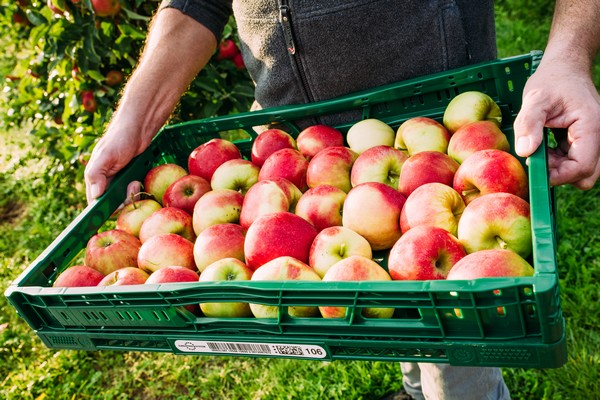 Euro Pool focuses on reusable packaging
Euro Pool focuses on reusable packaging
Once this process is complete, trucks will need to take 20,000 to 30,000 fewer trips. Dirk says a billion EPS crates are rotated in Europe. Several hundred thousands of these are rigid crates. The green containers aren't only collapsible. They each have a unique barcode which is scanned on entry and exit. You can, therefore, monitor them and optimize transport flows.
The barcode also makes it possible to automatically count and sort these crates while they’re being cleaned. “That means we save a lot of time and money for our end-users. They no longer have to sort the folding crates, which is the case with the rigid ones.” The barcodes will also prevent these crates from being used unlawfully.
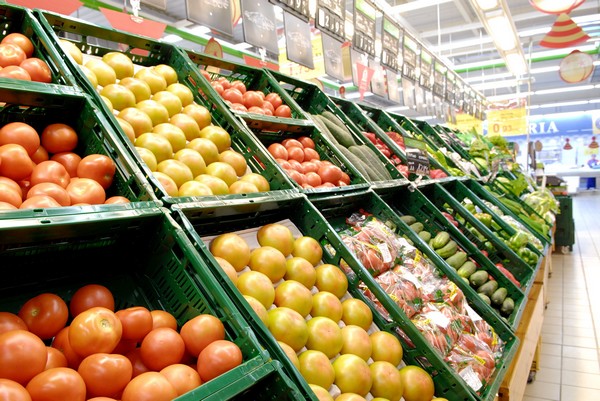 The use of folding crates makes the transport more sustainable
The use of folding crates makes the transport more sustainable
Foldability
Vercammen doesn’t foresee any problems with the crates’ foldability. For many clients, it’s part of the process. “Unfolding the crates, which can be slightly modified, can continue to be done manually.” The Regional Director says these collapsible crates will save time too. You need fewer pallets of these crates. “You have to pick up and place a rigid crate anyway. You can unfold these new crates while handling them.”
Some companies have automated this process. “Most of our clients realize that the collapsible crates are of good environmental value overall. They then look for folding and unfolding solutions,” Dirk concludes. EPS guides clients in how to handle these collapsible crates. Once you unfold one of these crates, you can use it exactly like you would a rigid one.
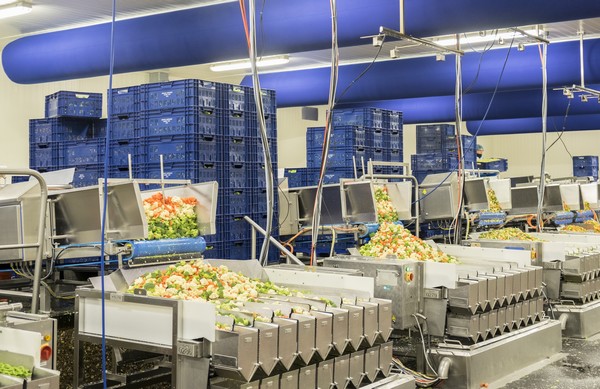 Schiphorst indicates that aspects such as your own color or hygiene can play a role in the choice of your own crates
Schiphorst indicates that aspects such as your own color or hygiene can play a role in the choice of your own crates
Different aspects
“Every change offers opportunity,” says Hans van Noesel about removing rigid crates from the rental pool. Hans is the Benelux Sales and Marketing Manager at Schiphorst Transport & Opslagtechniek. This Dutch company manufactures and distributes plastic logistics solutions. He says they've received more inquiries since this change was announced. Clients are also considering their own situations more carefully.
“They have to choose what kind of crate they want to use. And whether to rent or own these. This decision depends on many factors.” For example, clients often start as part of a pool. “That has its advantages, but growers’ associations sometimes have closed pools. Then it might be better to purchase crates. These eventually pay for themselves.”
Another factor in choosing crates is how a company’s logistics system is set up. If they've designed for a specific type of crate, this obviously influences the choice. Putting your company’s logo on the containers, having molded-in barcodes, or choosing a color for the crates can also play a role. Hygiene is another aspect. When a virus breaks out, it can be reassuring to control the crates and know exactly what they’ve been used for.
The crates are cleaned thoroughly using standardized cleaning processes and agents. However, you can’t avoid cross-contamination 100% of the time. But the product is also important. Take tomatoes - when handling these, you need a crate that’s not too deep. Then you can prevent damaging the tomatoes at the bottom.
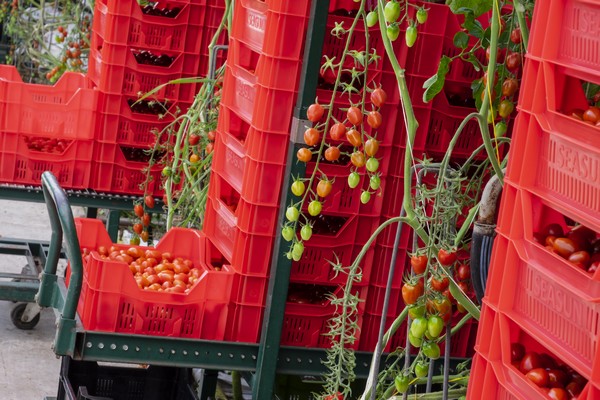
Pros and cons
Hans says both options have advantages and disadvantages. “Rigid crates can be loaded immediately but need more space during return transport and storage. Collapsible crates are better then. They save up 84% space but must be folded and unfolded. If you’re very busy, it can make a big difference. There is no right or wrong.”
In short, the choice of crate depends on many different aspects. That’s why Hans emphasizes the importance of good advice regarding this. “The right advice plays a crucial role. One of our company’s strengths is brainstorming with clients about specific plastic logistics solutions.
A second life
Whichever crates are chosen, Van Noesel is glad they’re made from plastic. Using this material isn’t always considered in a good light. He points out that the plastics industry thinks this is unfair. It isn’t the plastic but how the user handles it that causes issues. “If plastics are used and processed properly, it’s no problem. You can actually make a positive contribution by using this material.” Hans points out that plastic crates have a very long life cycle. And at the end of that cycle, the client and we look at where the containers will end up."
"We want to come up with ideas together to give the crates a second life. We can sell the crates second-hand. Or we can take them, recycle them, and reuse them in new products. Nothing needs to go to waste,” concludes Hans. An advantage here is that the Schiphorst folding crates are made entirely of plastic. Those in the fruit and vegetable sector usually mostly use rigid crates. But Hans sees an increasing preference for folding crates there.
More info:
 Euro Pool System
Euro Pool System
+31(0) 70 301 4134
www.Europoolsystem.com
Dirk.vercammen@europoolsystem.com
 Schiphorst Transport- en Opslagtechniek
Schiphorst Transport- en Opslagtechniek
T: +31 (0)570-622944
www.schiphorstbv.nl
sales@schiphorstbv.nl
"vegetable" - Google News
February 02, 2021 at 08:04PM
https://ift.tt/3rtGahZ
Fruit and vegetable transportation to be made more sustainable - FreshPlaza.com
"vegetable" - Google News
https://ift.tt/2CyIOeE
https://ift.tt/3aVzfVV
Bagikan Berita Ini














0 Response to "Fruit and vegetable transportation to be made more sustainable - FreshPlaza.com"
Post a Comment